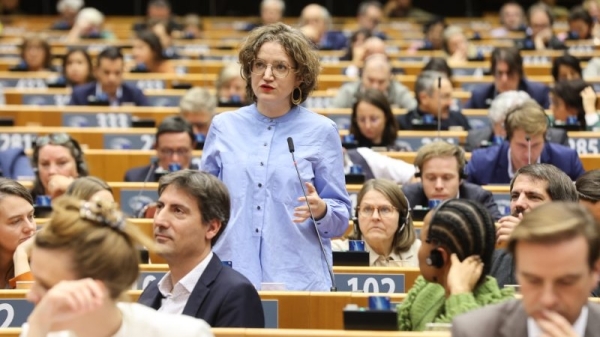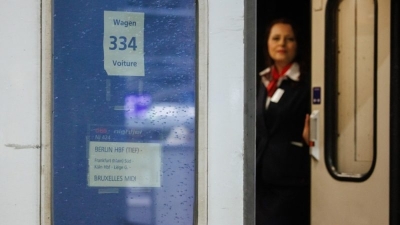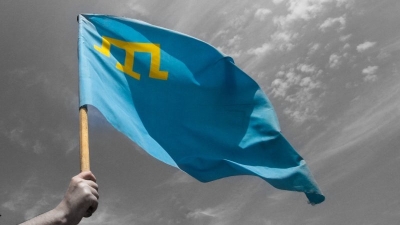French Greens urge Macron to form ‘anti-Mercosur coalition’

In a letter sent on Wednesday (31 January), France’s Greens called on President Emmanuel Macron to form a coalition with EU countries that also oppose the EU-Mercosur deal in its current form – an idea Macron’s camp has already dismissed as hopeless.
Since the start of the year, farmers have been protesting in Europe’s major cities, blocking roads and turning violent in some cases, bemoaning their working conditions, low food prices and the proposed reductions of state subsidies.
One issue that has also emerged as a sticking point is the free trade agreements that the EU signs with other countries or groups of countries, as these – in most cases – have a dampening effect on competition, particularly in the agricultural sector.
The situation, which has been quite critical in France, has also prompted the French government and Macron to reiterate France’s opposition to the EU agreement with Mercosur states – Brazil, Argentina, Uruguay and Paraguay – as it currently stands.
On the other hand, several EU member states, led by Germany, Portugal and Spain, remain firmly opposed to postponing the signing of the EU-Mercosur agreement – though it would appear that the idea of splitting the deal in two to make it easier to sign certain parts of it is being looked into.
However, in a bid to calm farmers’ anger, 35 French Green leaders sent a letter to Macron asking him to propose the formation of a “coalition” of EU countries against the deal before the EU Council meeting on Thursday (1 February).
Macron has not yet responded to the call of the ecologists, who are left to deal with the contradictions of their own group in the European Parliament.
EU summit must provide farmers with answers
Farmers must be provided with “clear and concrete” answers, such as “stopping the EU-Mercosur trade agreement”, which they are demanding at Thursday’s EU summit, according to the Greens’ letter.
They believe that the ongoing mobilisation in France and Europe is “forcing” Macron to “move from words to deeds” and therefore urge him to “work from this European summit to form a coalition of member states against the EU-Mercosur agreement”.
While the agreement has been in the works for more than twenty years, negotiations that stalled in 2019 when controversial former Brazilian president Jaïr Bolsonaro was in power have resurfaced in 2022 when the man who followed in Bolsonaro’s footsteps, socialist Luis Ignacio Lula da Silva, expressed a willingness to speed up the ratification process.
However, France has expressed its opposition to the agreement as it stands and wants it to include so-called “mirror clauses” that would require Mercosur farmers to respect similar environmental and social standards if the two blocs were to trade with each other.
“France is against it because it is an agreement that has been in place for several years and does not impose the same rules on Mercosur farmers and industrialists as ours,” Macron said on Tuesday (30 January) as he left for a two-day trip to Stockholm, while farmers’ protests in France spread to the outskirts of Paris.

Cars v cows: German automakers call to split EU-Mercosur deal to bypass French ‘non’
The EU-Mercosur trade agreement should be split into two distinctive parts to circumvent French resistance based on agricultural issues, the German car industry has proposed, in a bid to boost export markets other than China.
Macron’s side already ‘taking action’
However, France may get its way on this, especially as its political clout in Europe has already helped to halt negotiations that were well advanced last July, Pascal Lecamp, a member of the French majority (Mouvement démocrate, Modem), told Euractiv France.
But can Macron go it alone against Germany, Spain, Portugal, the European Commission and, of course, the South American states?
But while the Greens say this can only be done by gathering a coalition of like-minded states, Macron’s camp criticised the Greens’ call.
“We didn’t wait for the ecologists’ letter to take action,” said French MEP Marie-Pierre Vedrenne, who chairs the French delegation of the Renew Europe group.
“France has always sought allies and found some, such as Austria and Ireland”. So while “we are taking action, Marie Toussaint [French Greens head list for EU elections] should do her job” and talk to her “European Green colleagues who are members of pro-Mercosur government coalitions”, the MEP told Euractiv France.
Her comments were aimed in particular at the German Greens, who, as government members, are toeing the party line in favour of the agreement as it stands, even though Green officials from the regions and the party base oppose it.
“We reject the EU-Mercosur agreement in its current form and call for renegotiations” to include, in particular, the possibility of suspending trade preferences in the event of violations of sustainability standards, a manifesto of federal Green delegates published in November 2023 reads.
The German Green MEP Anna Cavazzini seems to be expressing her group’s opposition to the trade agreement as it stands.
“That is why it is mocking when other political groups, such as the conservatives, are now calling for rapid ratification of the EU-Mercosur trade agreement, which will only increase the pressure on our farmers”, she said on a op-ed for the Greens/EFA.
For now, Macron has not responded to the Greens’ proposal, Marie Toussaint, French MEP for Les Verts/EFA and head of the ecologist list for the European elections, confirmed to Euractiv.

Food as movies: The agricultural exception is gaining traction in France
France’s far-right Rassemblement National and far-left LFI are proposing to introduce a form of ‘agricultural exception’ – which, as is already the case for the arts, would exempt some agricultural products from the EU’s free trade agreements with other countries.
Read more with Euractiv




